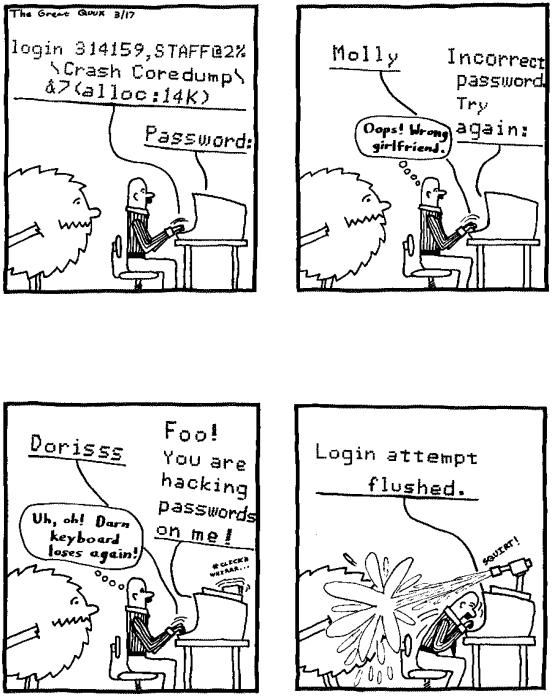 Crunchly gets {flush}ed.
(The next cartoon in the Crunchly saga is 76-05-01. The previous
cartoon was 76-02-20:2.)
Crunchly gets {flush}ed.
(The next cartoon in the Crunchly saga is 76-05-01. The previous
cartoon was 76-02-20:2.)
1. [common] To delete something, usually superfluous, or to abort an
operation. "All that nonsense has been flushed."
2. [Unix/C] To force buffered I/O to disk, as with an fflush(3) call.
This is not an abort or deletion as in sense 1, but a demand for
early completion!
3. To leave at the end of a day's work (as opposed to leaving for a
meal). "I'm going to flush now." "Time to flush."
4. To exclude someone from an activity, or to ignore a person.
`Flush' was standard ITS terminology for aborting an output
operation; one spoke of the text that would have been printed, but
was not, as having been flushed. It is speculated that this term
arose from a vivid image of flushing unwanted characters by hosing
down the internal output buffer, washing the characters away before
they could be printed. The Unix/C usage, on the other hand, was
propagated by the fflush(3) call in C's standard I/O library (though
it is reported to have been in use among BLISS programmers at {DEC}
and on Honeywell and IBM machines as far back as 1965). Unix/C
hackers found the ITS usage confusing, and vice versa.
 Crunchly gets {flush}ed.
(The next cartoon in the Crunchly saga is 76-05-01. The previous
cartoon was 76-02-20:2.)
Crunchly gets {flush}ed.
(The next cartoon in the Crunchly saga is 76-05-01. The previous
cartoon was 76-02-20:2.)
[glossary]
[Reference(s) to this entry by made by: {drain}{flush}{gas}{sync}]